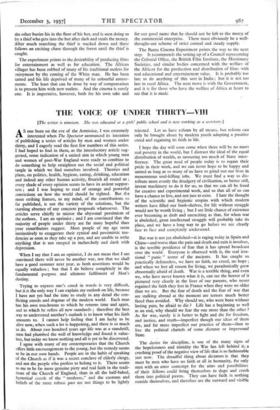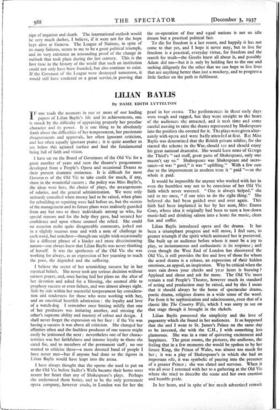THE VOICE OF UNDER THIRTY VIII [The u - riter is nineteen.
She was educated at a girls' public school and is now working as a secretary.] AS one born on the eve of the Armistice, I was extremely interested when The Spectator announced its intention of publishing a series of articles by men and women under thirty, and I eagerly read the first few numbers of this series. I. had hoped to find in them, as the introductory article sug- gested, some indication of a united aim in which young men and women of post-War England were ready to combine to do something to help straighten out the social and political tangle in which we find ourselves involved. Theories and plans, on politics, health, hygiene, eating, drinking, education and indeed any other human activity, flourish all round us ; every shade of every opinion seems to have its ardent suppor- ters ; and I was hoping to read of strange and powerful convictions on how the world should be righted. But the most striking feature, to my mind, of the contributions so far published, is not the variety of the solutions, but the startling absence of any concrete proposals whatsoever. The articles serve chiefly to mirror the abyssmal pessimism of the authors. I am an optimist ; and I am convinced that the majority of people under thirty are far more hopeful than your contributors suggest. Most people of my age seem instinctively to exaggerate their cynical and pessimistic ten- dencies as soon as they take up a pen, and are unable to write anything that is not steeped in melancholy and dank with depression.
When I say. that I am an optimist, I do not mean that I am convinced there will never be another war, nor that we shall have a good summer next year, as both assertions would be equally valueless ; but that I do believe completely in the fundamental purpose and ultimate fulfilment of Man's destiny.
- Trying to express one's creed in words is very difficult, but it is the only way I can explain my outlook on life, because I- have not yet had the time- to study in any detail the con- flicting creeds- and dogmas of the modern world. Each man has his own touchstone to which he returns time and again, and to which he refers all new standards ; therefore the best way to understand another's outlook is to know what his faith mounts to. cannot help feeling that I am lucky to be alive now, when such a lot is happening, and there is so much to do. About two hundred years ago life was at a standstill, men had plumbed the well of knowledge and found, it value- less, but today we know nothing and all is yet to be discovered.
I agree with many of my contemporaries that the Church offers little encouragement to the young, but the remedy seems to be in our own hands. People are in the habit of speaking of the Church as if it was a secret conclave of elderly clergy, and not the people who profess to belong to it. There seems to me to be far more genuine piety and real faith in the tradi- tions of the Church of England, than in all the half-baked, hysterical creeds of the " moderns," and the customs and beliefs of the more robust past are not things to be lightly rejected. Let us have reform by all means, but reform can only be brought about by modern youth adopting a positive creed and regaining its faith in life.
I hope the day will soon come when there will be no more real poverty in the world, but I distrust the ideal of the equal distribution of wealth, as savouring too much of State inter- ference. The great need of people today is to regain their pride in their work, and we can never hope to be happy and united as long as so many of us have to grind out our lives in monotonous soul-killing jobs. We must find a way to dis- tribute more evenly the drudgery of civilisation, or better still, invent machinery to do it for us, so that we can all be freed for creative and experimental work, and so that all of us can have a chance to live, and not just to exist. I hate the thought of the scientific and hygienic utopias with which modern writers have filled our book-shelves, for life without struggle would not be worth living ; but I see little chance of existence ever becoming as drab and unexciting as that, for when war is abolished, great intellectual struggle will probably take its place, and we have a long way to go before we see clearly face to face and completely understand.
But war is not yet abolished—it is raging today in Spain and China—and worse than the pain and death and ruin it involves, is the terrible pestilence of fear that it has spread broadcast over the world. Everyone is obsessed with it, the real irra- tional " panic " terror of the ancients. It has caught us practically defenceless, we have no faith, no creed, no hope ; and when we lost all reason for living, we paradoxically grew abnormally afraid of death. War is a terrible thing, and even we, who have never known what it is, can see the horror of it pictured very clearly in the lives of our parents, who never regained the faith they lost in France when they were no older than we are. But the fear of death and the fear of war that are stalking abroad at the moment are terrors much better faced than avoided. Why should we, who were born without lasting pain, be afraid to die ? Life has a beginning as well as an end, why should we fear the one more than the other ? As for war, surely it is better to fight and die for freedom, and justice, and truth—imperfect though our ideas of them are, and far more imperfect our practice of them—than to live the political chattels of some dictator or impersonal State.
The desire for discipline, is one of the many signs of the hopelessness and timidity the War has left behind it, a crushing proof of the negative view of life that is so fashionable just now. The dreadful thing about dictators is that they must be men who have no faith at all in humanity, for only men with an utter contempt for the aims and possibilities of their fellows could bring themselves to dupe and crush them into political pawns. They can have faith in nothing outside themselves, and therefore are the outward and visible sign of negation and death. The international outlook would be very much darker, I believe, if it were not for the hope kept alive at Geneva. The League of Nations, in spite of its many failures, seems to me to be a great political triumph, and its very existence an astounding proof of the change in outlook that took place during the last century. This is the first time in the history of the world that such an institution could not only have been founded, but also continue to exist. If the Covenant of the League were destroyed tomorrow, it would still have rendered us a great service, in proving that the co-operation of free and equal nations is' not an idle dream but a practical political fact. - To die for freedom is a last resort, and happily it has not come to that yet, and I hope it never may, but to live for freedom is a practical, everyday virtue, for freedom and the search for truth—the Greeks knew all about it, and possibly Adam did too—but it is only by holding fast to the one and seeking diligently for the other that we can hope to live lives that are anything better than just a mockery, and to progress a little farther on the path to fulfilment.



























































 Previous page
Previous page